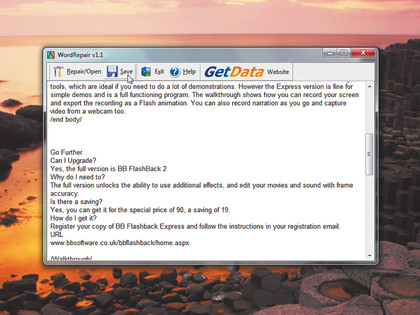How to recover a corrupt Word or Zip file

If you've had problems with corrupt files, you'll know how annoying it can be.
The following is an all-too common problem. "I recently had some problems with corrupt files. I'd archived some work to a flash drive. Believing it was no longer relevant, I deleted the original files and left my drive in a drawer."
"Months later, I needed to refer back to them. I plugged in my drive and copied the files back to my PC. However, one of the Zip archives won't extract due to corruption, and I also can't access a Word file. Is there a way to get any data back?"
Obviously you need to address how you archive older material to ensure that problems with physical media won't harm your data. Your story also highlights the need for multiple archived copies.
Data corruption is frustrating because it's often caused by small failures in storage media that affect larger files by introducing frame shifts in the data, or removing essential information in file headers. This renders the files impossible to open in the conventional way.
However, there are ways to access the remaining data and rescue at least some of the files. Let's start with the Word file.
If it was a .doc file produced by a version of Word earlier than 2007, you may be able to rescue the text using Notepad. Launch Notepad and choose 'File | Open'. In the 'Open' dialog, change the file type to 'All Files' and browse to your .doc file. Select it and click 'Open'.
Sign up for breaking news, reviews, opinion, top tech deals, and more.
Amid the mess of formatting characters, you'll find your original text – copy and paste it into a new document. Text recovered this way loses all formatting, plus any other elements in the file.
For a more sophisticated method, try Repair My Word, a free download. Download and launch the executable, click 'Repair/open' and browse to the file you want to fix. Recovered text is displayed in the main window. Click 'Save' to save it as an RTF file.

Neither of these methods works on the newer .docx files. These are less vulnerable to corruption, but there's no simple, free method to get at the text if one is damaged. Docx Repair is available and costs $45 (around £28). You'll need to buy it to save recovered documents, but there's a free version that displays recovered text so you can check it works before you buy.
You may have problems with Zip files, because they can contain multiple other files that are lost if you can't open the archive.
DiskInternals Zip Repair is available as a free download. It examines any archive, extracts usable data and creates a new copy that you can use to recover the files.
Launch Zip repair and choose 'Next'. Browse to your damaged Zip file and open it. Provide a location and name for the repaired file and click 'Next'. The program then scans and fixes your archive, saving a new copy for you to open.